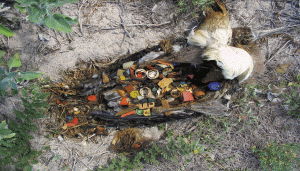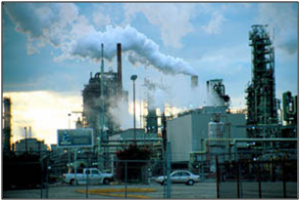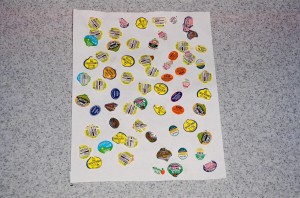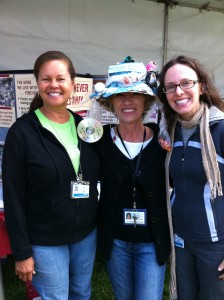
Laysan chick albatross on Kure Atoll, Pacific Ocean. Photo by Cynthia Vanderlip, courtesy of Algalita Marine Research Foundation.
“We may not think about them often, but versatile plastics inspire countless innovations that help make life better, healthier and safer every day. ”
– American Chemistry Council

PVC factories emit dioxins and other hazardous chemicals.
Factories in the United States produced 58 million tons of plastic in 2007. In that same year, Americans threw away more than half that amount. While science is revealing the toxic effects of plastic chemicals, the plastics industry invested $10 million in an ad campaign to persuade us that plastics are safe, convenient, and essential for a clean lifestyle.

While municipal zero waste programs institute composting around the country, more and more of our fresh fruits are being wrapped and labeled with non-biodegradable plastic.
It’s time to hear the deeper story about plastic pollution
Green Sangha’s grassroots activists have been involved in sharing this information with citizens and decision-makers since 2006. Through 288 presentations, we have spoken to 8500 citizens (from schoolchildren to retired persons) about plastics and the social/industrial forces driving this environmental catastrophe. We have testified at public hearings on behalf of zero waste and plastics reduction.
We co-led a successful voter drive to ban plastic bags in the town of Fairfax, California. One member has visited every business in San Anselmo to inform store owners of the Town’s resolution to eliminate plastic bags.
We have also inspired numerous schools, businesses, and agencies to reduce their consumption of plastic. We worked closely with the County of Marin on two successful plastics reduction measures: a single-use bag reduction ordinance and a ban on polystyrene food service items. We are also advocating a statewide framework for Extended Producer Responsibility (producer take-back).
Our collaborators include numerous local and state environmental organizations as well as farmers’ markets and recycling experts. Our goal is to inspire not only individual change but also coordinated grassroots efforts to change local, state, and national laws.
When citizens see the environmental and health costs of plastics, they naturally want to reduce their plastic footprint and to help other people do so as well. With Ben Zolno of New Message Media, we produced Plastic State of Mind, a rap parody which has had over 870,000 views.
 We have a well-educated, highly-committed core of volunteer activists, a broad base of community connections, and the creative ideas and energy needed to expand our campaign for significant outreach and cultural change. Help us spread the word and get the nation seriously Rethinking Plastics!
We have a well-educated, highly-committed core of volunteer activists, a broad base of community connections, and the creative ideas and energy needed to expand our campaign for significant outreach and cultural change. Help us spread the word and get the nation seriously Rethinking Plastics!
About Plastic…
The weight of plastic produced annually in the United States is more than twice the weight of our entire population. Plastic waste is accumulating not only in our landfills, but also in our streets, parks, and waterways. A 2008 trawl of surface waters of the northern Pacific Ocean recovered over 40 pounds of plastic pieces for every pound of zooplankton. If current trends of production and disposal continue, this ratio is expected to climb to 60:1 within a decade. In this section of the ocean, one million plastic particles were found floating near the surface for every square kilometer, up three times since the early 1990s.
Across the country, any loose trash item will likely end up in our waterways. Plastic bags and cups are picked up by wind or rain, and storm drains and creeks carry them downstream. In the San Francisco Bay Area for example, plastic items make up 51.5% of trash in creeks. Because plastic never biodegrades, the total trash load continues to grow. This litter is not only an eyesore; it harms wildlife and threatens vital habitat. In the North Pacific, an estimated 100,000 marine mammals die yearly from accidental ingestion or entanglement in plastic debris. One million seabirds die this way.
When plastic articles break into smaller pieces, their essential constituents (long-chain polymers) remain intact. These polymers resist metabolism by any creature, great or small. Jellyfish and salps, the most efficient filter-feeding organisms in the ocean, have been found with plastic particles firmly embedded in their tissues. These particles move up the food chain, all the way to humans. Plastics and their additives also migrate directly into our food via plastic containers. Even small amounts of these chemicals that get into our food or air can have harmful effects, including male infertility, premature puberty, asthma, cancer, and insulin resistance.
Further, using plastic wastes precious resources: an estimated 3 million barrels of oil are required to produce the 19 billion plastic bags used annually in California. Only a few plastic carryout bags use recycled content; most of those contain only around 5% recycled material. In San Francisco, an estimated 50-150 million grocery bags had been dispensed from major grocery stores each year, most of them plastic. The 2007 ban of plastic bags reduced the numbers, but is only a beginning. In Marin County, to the north of San Francisco, we estimate 10-40 million bags leave grocery stores each year, and many more from other retail outlets. All of this is just the tip of the plastic iceberg.
One particularly wasteful use of plastic is the purchase and disposal of 93 billion water bottles every year. Transporting this water increases greenhouse gas emissions (each gallon of water weighs about 8 pounds), and puts undue pressure on low-income families (the cost of bottled water is over 1000 times the cost of tap water, which is usually safer, too).
Our exposure to plastic is universal, and growing. To reverse these dangerous trends, we must rethink our approach to consumption, our reliance on toxic chemicals, and the founding premise of profit over everything else. In other words, rethinking plastics means rethinking our lives.
Get involved!
We invite you to join our campaign to Rethink Plastics and Rethink Our Lives. You can start by looking at one of our articles, viewing our slide presentation, or clicking on any of the websites below. Then, contact us with your ideas and wishes. Together we can stem the tides of pollution and restore beauty and health to the planet.
Green Sangha plastics flyers (PDF documents):
- The California Product Stewardship Council works to promote product stewardship and extended producer responsibility (EPR).
- Visit the Agalita foundation to learn more about plastic in the ocean: http://www.algalita.org/ and http://www.plasticdebris.org/
- My Plastic-free Life is one Green Sangha member’s personal blog documenting her efforts to reduce the amount of plastic in her life and find healthy alternatives to plastic products.
- Green Mary does Bay Area event greening. A major part of her event waste diversion is resource management and eco-education, focusing largely on plastics reduction and providing alternatives to one-time use water bottles. She helps to install permanent or temporary water filtration systems and dispensers so that attendees can refill their own water bottles rather than relying on the steady stream of “recyclable” ones that pour through events each year. Event composting and recycling maximization, green consulting, and a highly informative water bottle presentation for events, businesses and municipalities with viable, visionary alternatives. www.greenmary.com
- Sarah “Steve” Mosko, PhD, prepared the original PowerPoint slide show that we have shown to thousands of citizens, students, and decision-makers. Her blog, Boogie Green, covers a wide range of sustainability topics, all beautifully written, and deeply researched: http://www.boogiegreen.com.

